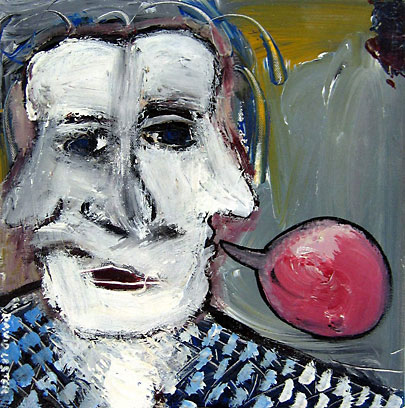 Every Saturday, we’ll be posting a new illustration by David Lester. The Mecca Normal guitarist is visually documenting people, places and events from his band’s 25-year run, with text by vocalist Jean Smith.
Every Saturday, we’ll be posting a new illustration by David Lester. The Mecca Normal guitarist is visually documenting people, places and events from his band’s 25-year run, with text by vocalist Jean Smith.
I pick the place for the date: a radical bookstore to which Zack, a 47-year-old English student, has never been, even though it’s only two blocks from where he lives on the downtown eastside.
Question and answer, we tell our life stories over dinner at a pizza place and go for a walk on the pier where cruise ships dock and American tourists meander.
Zack’s a party guy. A skier. A waiter. His favorite place to work was a Greek restaurant where the staff was encouraged to drink—half price—upon arriving for work. The coke dealer showed up, and the day began.
He owned three Chevy Impalas in a row. A self-described waiter/ski bum until he was 39, when his parents died. He didn’t handle it very well. He didn’t handle death very well. He took a room in the creepiest of the crappy skid-row hotels and lost his belongings when he couldn’t pay the rent. He claims he moved down there because that’s where the services are. “You got your rehab, your detox and counseling. You got your 12-step and your food bank.”
Warning warning warning. Red flag. No one moves to skid row to get clean. Will I be playing the part of the woman helping him get his life back on track?
Standing on the pier half-watching the sun go down, a cloud of mist is giving great definition to the trees, which should have been flat and invisible. I am thinking of saying something about how the mist is making things clear, but I decide to keep that thought to myself.
I feel I am with a boy, a very young boy—he’s only been away from home 27 years, he’s only had 27 summers and 27 winters of partying and skiing. I guess that’s why he hasn’t got anything together yet. I don’t think he realizes it, but his life has gotten away from him.
After quitting school in grade 11, he bought a van so he could go on ski trips to Whistler. He didn’t leave home until he was 22.
I ask about his plans. He might like to go backpacking in Europe—skiing in Switzerland, but not while he’s still a student. I cannot make him a 47-year-old man. He remains a boy: tall, skinny, boyish features with a faded, worried look.
Fallen skier, waiter, party guy slips into an anxious silence. I feel the urge to ask, “What’s wrong?” Oh god! Let me not start with that! We may have run out of things to say. I told my Readers Digest version of my life story over dinner. He gave no indication of being attracted to me—no compliments, no lingering looks across the table intending to reveal interest. We didn’t talk about relationships or dating expectations. It was like being stuck with a visiting friend of a friend getting rooked into going out to dinner. Our conversation was only kind of OK.
Near the end, out on the pier, after the sun has gone down, he asks me about this music of mine. “Is it ever all-out punk?”
He seems concerned that it might be hardcore punk. I stand, a small middle-aged woman in a fantastically subtle silk jacket all the way from Japan. Hush Puppies. Long brown hair blowing in the wind, and this guy is fretting over the possibility that I’m actually Henry Rollins. I try to explain punk, myself, but fail at making an impact here. He never did ask the name of my band. Never tried to touch me.
I ask what sort of music he listens to. He says his taste is eclectic. My least favorite answer to a question meant to increase understanding. Eclectic in this case means that music isn’t really important to him. He says his taste varies and he’s never been into the live-music scene. After eclectic comes techno. I’m still trying to make him 47—he’s stuck in my mind as a boy. A boy who might backpack around Europe once he finishes school.
Carefully, I ask if he does anything you might call creative—perhaps he finds creative expression making an espresso, a cappuccino. I don’t know. He thinks a minute and says, “I don’t play music or paint, if that’s what you mean, but I do watch TV.”
Free cable in his creepy-freaky hotel room.
“And,” he adds. “I like to go to the movies.”
I can only half-think about being so grey and dispassionate to call watching TV and going to the movies creative. I guess, to him, art is a hobby, and his hobby is being entertained.
The sun is down, and I blurt out, “I have to get back to the other side of town. I get up early to write.”
He walks me to my bus stop. He seems sad again. I ask if I can give him a hug, I mean a hug good-bye. We hug, and he cheers up. He decides to wait with me for the bus. By the time I get home, he’s emailed to ask me out again. I should have skipped the hug. I go to bed rather than hit reply.







One reply on “Normal History Vol. 35: The Art Of David Lester”
Jean, I absolutely love your online dating anecdotes. They break my heart and yet uplift me at the same time. Thank you for being so brave and gutsy.
David, the artwork is great too.